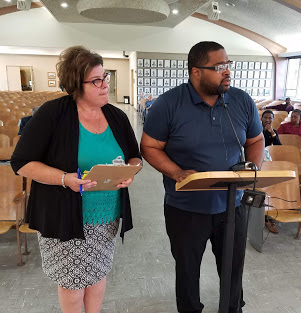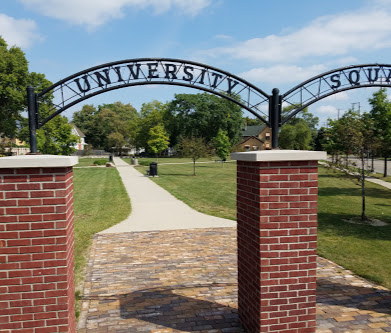By Tom Travis
At its regular meeting Monday, Sept. 9, the Flint City Council declined to consider a resolution regarding a controversial affordable housing development in Carriage Town, after Councilperson Jerri Winfrey-Carter, whose ward includes the contested parcel, declared, “I’m going to fight this nail and tooth…because my constituents do not want this.”
In other business, the council debated proposed sales of properties owned by the Genesee County Land Bank, discussed a letter from Mayor Karen Weaver, and considered a north end property with a $36,000 water bill.
Contested Carriage Town proposal draws objections
Glenn Wilson, president and CEO of Communities First, Inc. (www.communitiesfirstinc.org) appeared before council to describe his plans. Wilson has developed several properties in Flint in recent years including Oak School at Grand Traverse and Court, Swayze Apartments on Court Street downtown and most recently, Coolidge Park Apartments near McLaren Hospital on Ballenger Highway.
Wilson said he hopes to develop a piece of land currently owned by Troy Farah at Grand Traverse And University avenues into an affordable housing project of four buildings of three stories each containing a total of 48 units. The plot, on a piece of property in the Carriage Town Historic Neighborhood (http://cthna.org), is cherished by many neighbors and is affectionately referred to as University Square.
Councilperson Jerri Winfrey-Carter from the Fifth Ward, which includes Carriage Town, responded to Wilson that the constituents in her ward, “do not want this. That space is a park. I’m gonna fight this nail and tooth. This is the first reading but I’m going to fight hard because my constituents do not want this.”
She stressed she has heard from many residents who have expressed their dislike and “absolute refusal” to allow the development.
Councilperson Eva Worthing (Ward Nine) chimed in to support Winfrey-Carter, adding, “Why wasn’t another location chosen?” Wilson explained this particular property fits the criteria for affordable housing that would allow for the tax break through the city’s PILOT (Payment In Lieu Of Taxes) program.
After hearing Winfrey-Carter’s passionate pledge to fight against the development, Councilperson Eric Mays (Ward One) told Wilson developers need to work better with wards and city officials to communicate their intentions and plans.
Wilson assured Winfrey-Carter he had reached out to her and had met with the Carriage Town Neighborhood Association. He said he had received approval from the zoning board and the city’s historic district commission.

Suzanne Wilcox, director of city planning and development and Glenn Wilson, president and CEO of Communities First, Inc., a company that is developing several properties in Flint, answer council questions about the property he hopes to obtain and develop into an apartment complex of four buildings of three stories each at the northeast corner of University and Grand Traverse avenues. The property is owned by Troy Farah and is a green space in the heart of the Historic District of Carriage Town (Photo by Tom Travis)
Suzanne Wilcox, the City’s director of planning and development, affirmed the project is a PILOT (payment in lieu of taxes) program through her department which allows for a tax break to Communities First, Inc.
Wilcox said without the PILOT program the development would generate $68,900 yearly in tax money to the City of Flint. However, with the PILOT program Communities First, Inc. would pay $22,000 in taxes to the city.
Wilcox further added this would be $22,000 a year coming into the city on a property that presently does not generate any taxes.
According to city records, however, the property does generate $1400 a year in taxes from Carriage Town Ministries who lease the property and have been responsible for the development and beautification of the property.
According to Dallas Gatlin, executive director of Carriage Town Ministries, a total of $200,000 in grant money from the C.S. Mott Foundation and the Ruth Mott Foundation, plus donations of benches and trash receptacles from Kettering University have been invested in the property over the past eight years.
A first reading of the resolution for the development of this property did not pass, with a four- yes/four-no vote, meaning the council declined to consider it. The resolution could return to the council’s agenda when City Planning and Development puts it forth as an agenda item and if Communities First, Inc. decide to continue pursuing the plans.

Entrance to the park at Grand Traverse and University avenues where Communities First, Inc. aims to construct a 48-unit affordable housing complex (Photo by Tom Travis)
Fifth Ward constituents speak out
In follow-up, on Wednesday Winfrey Carter met with some of her constituents in the Fifth Ward in the Carriage Town Historic Neighborhood to discuss their opposition to the Communities First proposal.
Constituent Nancy Sinclair presented Winfrey-Carter with a two-page typed list of names of individuals, businesses and organizations in the Carriage Town Historic Neighborhood who oppose the development of the property into an affordable housing unit.
In a prepared statement, Ken Van Wagoner, owner of Good Beans Cafe at 328 N. Grand Traverse, asserted, “The mass and density of the project is overwhelming for the area. A better spot for this size project would be 500 feet west, on a property owned by an entity that wants the project; Hurley Hospital. A smaller scale, townhouse style project like the newer buildings on the river, or the Carriage Town Square Apartments would be a much better fit in the University Park area.”
It was noted that there were some Carriage Town Historic Neighborhood residents who do support the development of this property into affordable housing units.
One resident asked, “If Communities First, Inc. develops here, where will they want to develop next?”
Another, William Gainey, agreed with Van Wagoner, stating, “We are against the scale, size and high density of building to land area in this particular project.”
While noting that the architect for the project is also a Historic District Commissioner for the city of Flint, Kurt Neiswender, serving a three-year term beginning in 2019, several neighbors said they were concerned the structure would not complement the already existing neighborhood.

Fifth Ward Councilwoman Jerri Winfrey-Carter (left) meets with Carriage Town residents, including Ken Van Wagoner and Nancy Sinclair (Photo by Tom Travis)
Second Chance Church wants former Jefferson School
The resolution on Land Bank properties, as written in the agenda, had blank spots for the addresses of subject properties. But In the Special Affairs committee before the regular meeting, Eric Mays (Ward One) produced a list of addresses he wanted to be put into the resolution.
One address ultimately considered was 5306 North Street, the former Jefferson School. Council were informed Second Chance Church is interested in purchasing the building for their church.
City Administrator Steve Branch informed the council that there is a water bill for $36,000 connected to this property, adding, “the property needs to be in good standing and with a $36,0000 water bill this is going to be an issue.”
Galloway asked if the administration had been in dialogue with Second Chance Church. Branch said no, but clarified that “in good standing” means the bills have to be paid and the water bill would have to be taken care of for any purchase to proceed.
Weaver answers council request to appear with a counter-request
The letter from Mayor Karen Weaver was a response to a motion made at a tumultuous Sept. 4 meeting at which Aonie Gilcreast, Weaver’s chief advisor whose formal title is Outreach Development Liaison, had been subpoenaed. At that meeting, Gilcreast appeared before the council with a city-appointed attorney, Ken Scott.
Within ten minutes of the questioning, Scott got into a yelling match with First Ward Councilperson Eric Mays which included a violent threat from Attorney Scott towards Mays, and Gilcreast and Scott walked out of the chamber.
In the discussion that followed that incident, the council moved “to do all things necessary to have Mayor Weaver come before the council.” Instead, Weaver wrote a letter. dated Sept. 9, in which she requested to know the topic of questions the council wants to ask.
In council session after receiving the letter, council members specified they want to ask Weaver two questions: first, about the $12 million bid for restoration of city streets, sidewalks and curbs following pipe replacement, the reason for re-bidding the project and the process that ensued.
Second, council members said they wish to ask the mayor about the absence of city officials from city council meetings. However, Councilperson Allan Griggs (Ward Eight) suggested, the council’s response to the mayor should be, “the city of Flint, that’s the topic.”
The rest of the council agreed all City of Flint topics are on the table if the mayor chooses to appear.
The next scheduled City Council Committee meeting is at 5 p.m. Wednesday, Sept. 18.
EVM Staff Writer Tom Travis can be reached at tomntravis@gmail.com.


You must be logged in to post a comment.